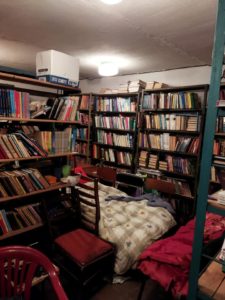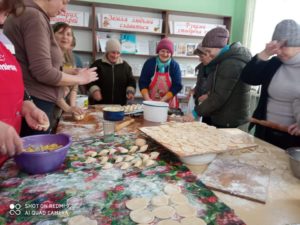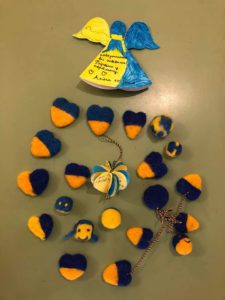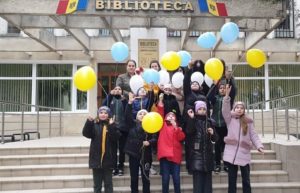Looking to Libraries for Resilience: stories of support in Ukraine and beyond
03 May 2022
In times of hardship, individuals turn to one another to overcome, to recover, and to rebuild. The places where communities meet, where they can access services, and come together to support one another are therefore important for building community resilience.
In the months since the outbreak of war in Ukraine, the role of libraries in building resilience within their communities has gained international attention.
Stories of libraries within Ukraine supporting their communities, libraries across Europe welcoming newly arriving refugees, and libraries around the world voicing solidarity and providing support have offered inspiration and hope.
They have illustrated how libraries, and those who staff them, adapt to challenges, and consistently uphold their mission to provide support and information for all – even in the most difficult times.
Within Ukraine: Mobilising for community support
From the early stages of the war, libraries in Ukraine mobilised to serve the evolving needs of their communities.
As part of their response, the Ukrainian Library Association (ULA) urged library professionals to focus on actions that were possible under the enormously difficult circumstances. They encouraged libraries to arrange shelters for evacuees within their spaces, organise collection points for humanitarian aid, and continue their work upholding access to information and countering disinformation.
According to guidance by the ULA, this can be done in part by promoting access to good quality information and sharing first-hand accounts, photos, and videos of the situation on the ground. This relates to the work the ULA has carried out in terms of crowd-sourcing damage to libraries – read more on that here.
Libraries in Ukraine have answered this call. The ULA has reported libraries across Ukraine acting as collection points for food, medicine, and clothing. Further, the ULA reports volunteers and staff in libraries engaging in supportive activities including knitting socks and scarves, holding first aid training sessions, and providing psychological support from trained professionals to their community members.
Access to Information
The ULA reports that, in the early stages of the war, libraries supported their communities by sharing critical information on emergency response. For example, they used social media and library websites to raise awareness on the availability of bomb shelters, share tips on how to respond to an alarm, what to pack in an emergency suitcase, and how to support children in emergency situations.

Libraries have continued aiding local users and displaced people by providing computers with internet access and copying documents free of charge. They have shared examples from the town of Tulchyn and city of Vinnytsia, where libraries are further supporting migrants by sharing information on local administrative and social services.
They have reported libraries working with their village councils to provide updates and critical information to elderly, sick, and disabled residents in their communities.
For example, Berezansky Public Library has been using its social media pages to share official information from local authorities, such as rules of conduct during curfew. Further, the library has used its communication channels to share helpful advice from psychologists and recommend literature from local authors and Ukrainian classics.
Coordinating Volunteers and Reassigning Library Resources
The ULA reports that a number of libraries, such as Tulchyn Main Library in Western Ukraine, have acted as housing centres, hosting internally displaced people within their premises.
Libraries have also reassigned their resources to provide necessary assistance. For example, librarians at Yevgeniv Village Library have contributed by sewing hospital gowns for use in nearby healthcare facilities.

Librarians at the Pishchanka Public Library have helped vulnerable people in their communities by providing assistance with purchasing and delivering medicine and other essentials.
Libraries in the Kobliv community have reportedly coordinated volunteers to prepare food and sew camouflage netting, activities which have also been carried out in many other libraries around the country.
Continuity of Services
In Kharkiv, a city that has sustained significant bombardment over the previous months, city libraries are working with the Department of Culture to distribute books from underground metro stations [read more here]. These stations have become shelters for the city’s population, and through this volunteer effort have been transformed to also be places to access books, creative workshops, and entertainment events for children.
Since the war began, the Lviv Regional Library for Youth has become a place of shelter for a great number of displaced people fleeing other parts of the country. The library has coordinated volunteers and engaged in humanitarian activities to support those in need, such as by preparing food. However, beyond this, they have continued acting as a a cultural institution, engaging visitors of all ages in activities that celebrate Ukrainian intangible cultural heritage, such as through traditional song and dance.

Despite the hardship, they have carried on by organising therapeutic cultural and artistic events, lecture series, and offering literature recommendations, among other activities.
Lviv Public Libraries have also organised donations of Ukrainian language books to Poland and Germany, and host creative events for locals and displaced people in their communities.
Finally, the Luhansk OUN_B is a mobile library working to serve users in the territory of Luhansk. Their mission includes aiding librarians and users in this region, providing expert psychological support and access to information, and continuing to promote Ukrainian literature among as many users as possible.
Across Europe: Supporting Displaced Communities
According to the United Nations High Commissioner for Refugees, over five million people have fled Ukraine since February 2022. Three million refugees have entered Poland, with large numbers also entering Romania, Hungary, and Moldova, among others.
Citizens and institutions within these countries have shown solidarity and mobilised to support Ukrainians – offering donations, transportation, and accommodation.
Within this response, libraries in neighbouring countries and across Europe have also acted to support incoming Ukrainian refugees.
For example, libraries across Europe have worked to accumulate books and other resources in Ukrainian language, including Belgium, the Netherlands, Czech Republic, and Germany, among others.
Polish libraries have been offering essential aid for Ukrainians as they arrive, as well as support in terms of access to books, audio-books, educational and cultural materials in Ukrainian language.
The Provincial Public Library in Krakow prepared a “Library support and assistance” plan to support the needs of their Ukrainian community. Activities include the purchase of Ukrainian literature and films for the library’s collection, organisation of Polish language lessons, and literary walks around Krakow in Ukrainian. This plan further included the launch of a lecture series providing expert legal and accounting advice, as well as cultural integration meetings and children’s events.
The library also acted as a collection point for donated goods, reporting to have collected over 400 prams, 30 baby cots, as well as baby carriers, feeding chairs, clothes and toys for distribution.
Likewise, the National Széchényi Library of Hungary launched a fundraising campaign, and delivered many boxes of non-perishable food, sanitary products and bottled water to support incoming refugees.
The German National Library has expanded their current scholarship programme to offer four additional scholarships for librarians that have fled or are in the process of fleeing Ukraine. Find out more here.
Czech librarians, like many others across Europe, have been working to ensure that Ukrainian users – especially children – feel welcome and can access materials.
For example, the Club of Creative Librarians, a division of the Association of Library and Information Professionals of the Czech Republic, together with the Slavic Library of the National Library of the Czech Republic, have translated its recent publication of children’s activities, “Maly tvorivec / Creative Child”, into Ukrainian. This publication [download here] contains a number of creative and educational activities targeted towards preschool and primary school aged children.
Libraries have called on their communities to make other donations as well. For example, the National Library of Georgia, in cooperation with the Blood Bank of the Institute of Hematology, organised an event at the library to collect blood donations for Ukraine.
The National Library of Latvia calls on the nation’s cultural heritage professionals to donate collection-protective materials such as cardboard boxes, foam-core board, and fireproof and shock-absorbing materials. The National Library coordinated collection of donations and transport into Ukraine.
The National Library of Moldova, together with the Association of Librarians of the Republic of Moldova, launched the “Colorăm Copilăria”(Colouring Childhood) campaign, in which they collected donations to help Ukrainian children be creative, such as art supplies, colouring books, board games, and puzzles.
The Association also reports that Chișinău city libraries have been holding language sessions and creative workshops for children, as well providing information and logistics services to newcomers.

Romanian libraries have likewise offered special events geared towards children as well as adults.
Some of these activities enabled cultural exchanges – inviting Romanian and Ukrainian participants to share their cultures with one another.
The Tulcha County Library, for example, held an event in which Ukrainian children were invited to read Ukrainian poems and perform familiar songs and dances [see the video here].
Following this event, the Vice President of the County Council, Mihai Hulení, remarked:
I admit that I am deeply moved. We cannot forget what you left behind at home. We all share your pain, we are with you and we are sorry to see you in this situation. But we promise you that the Romanian people will always be with the Ukrainian people. We hope that moments like today will occur in the future when there is peace. Because there will be peace and it will be good [source].
Echoing this sentiment, the community that is created within libraries in times of hardship is a strong factor towards building resilience – it can help build back better.
***
There are many more examples from across Europe and beyond. See the How to Help page of the Libraries for Ukraine website for more.
IFLA continues to liaise with our members in Ukraine as well as our partners at the international level to provide assistance and support where possible.
As a reminder, the ULA and the Library Country Charitable Foundation have created a fund to provide financial assistance to librarians who are facing difficult circumstances.
The ULA reports that these funds will be used to support librarians from regions where active hostilities are taking place. Support can take the form of temporary rent and purchase of necessities like medicine, clothes, and food.
Donations are accepted in local and international currency via bank transfer.
Find out more about the fund here: Financial assistance to Ukrainian librarians.